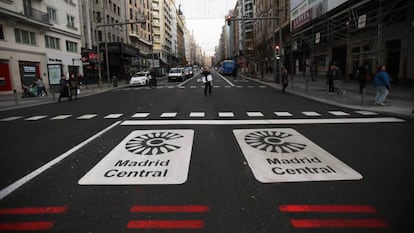Will a right-wing mayor axe the Madrid Central anti-pollution plan?
José Luis Martínez-Almeida of the Popular Party wants to review the signature program put in place by outgoing leftist city leader Manuela Carmena

José Luis Martínez-Almeida, who looks set to become the new mayor of Madrid following municipal elections held on Sunday, says that his first measure will be to “address Madrid Central,” alluding to a low-emissions area recently put into place in the city center.
The Madrid branch of Almeida’s Popular Party (PP) wants to go back to an earlier, less-strict traffic-restriction system based on priority for residents. “Our position was clear, and it was one of the pillars of our campaign,” said Almeida.
It was so pleasant for us. Are they going to reopen my street to traffic?
Javier Noriega, photographer
The politician added that there are more efficient ways of fighting climate change than Madrid Central, such as subsidies for buying a new, low-emission car. He added that when he becomes mayor, he will focus on “the problems that matter the most to Madrileños,” such as street cleanliness and conservation.
But Javier Ortega Smith, the secretary general of Vox, a far-right party that could enter the Madrid executive, announced on Sunday that “starting tomorrow, Madrid Central is over.”
Introduced in November 2018 to curb air pollution and give more space to pedestrians, Madrid Central was the signature measure of the outgoing mayor, Manuela Carmena of the leftist Ahora Madrid party. The program made 472 hectares of the city center off-limits to traffic except for zero-emission vehicles, local residents, public transportation and a few other exceptions.

A study released in March showed that emissions of nitrogen oxide (NOx), a polluting gas released by vehicles, fell by 38% in Madrid’s center the first month the program was implemented, while carbon dioxide (CO2) emissions dropped by 14.2%. Additionally, traffic was reduced by as much as 24% on frequently congested thoroughfares such as Gran Vía. A municipal survey of Madrid residents gave the measure a 6.1 on 10.
While the PP – which governed the city of Madrid uninterruptedly from 1991 to 2015 – obtained its worst result ever in the municipal polls on Sunday, it expects to secure backing from the center-right Ciudadanos and the ultra-nationalist Vox to form a local government.
Speaking about Madrid Central, Begoña Villacís of Ciudadanos – who could end up as the deputy mayor – said “we would not revert it directly. You can’t spend your whole life reverting things.” Instead, “we’re going to reform it.”
Now what?
On Monday morning, residents of Madrid’s city center were left wondering how the political changes would affect traffic in their area.
“Now what? It was so pleasant for us. Are they going to reopen my street to traffic?” wondered Javier Noriega, a 34-year-old photographer who lives in the trendy neighborhood of Malasaña.
Despite the political rhetoric, the traffic restrictions are based on a city ordinance that would require an absolute majority to reform. And a highly fragmented council makes this unlikely.
Additionally, the pollution-reduction program was part of a bid to avoid a multimillion-euro fine from the European Commission, which had warned Spain about its urban contamination. If the program were to be axed, Spain would face sanctions once again.

A similar plan
Previous PP administrations introduced four areas awarding priority to residents’ vehicles and their guests: Embajadores, Cortes, Letras and Ópera. Exceptions were also made for delivery vans and other special vehicles.
It was essentially similar to Madrid Central, only on a smaller scale. Former PP Mayor Ana Botella in fact attempted something similar to Madrid Central, but got around to it too late in the political term.
The only real difference between Botella’s and Carmena’s plans is that the former allowed transit on major thoroughfares such as Gran Vía, Atocha and San Bernardo, whereas the latter closed those off to non-residents as well.
Refurbishment work to Gran Vía has since reduced car lanes and widened the sidewalks, a move that was applauded by 85% of the more than 200,000 respondents in a municipal survey conducted in April.
English version by Susana Urra.
Tu suscripción se está usando en otro dispositivo
¿Quieres añadir otro usuario a tu suscripción?
Si continúas leyendo en este dispositivo, no se podrá leer en el otro.
FlechaTu suscripción se está usando en otro dispositivo y solo puedes acceder a EL PAÍS desde un dispositivo a la vez.
Si quieres compartir tu cuenta, cambia tu suscripción a la modalidad Premium, así podrás añadir otro usuario. Cada uno accederá con su propia cuenta de email, lo que os permitirá personalizar vuestra experiencia en EL PAÍS.
¿Tienes una suscripción de empresa? Accede aquí para contratar más cuentas.
En el caso de no saber quién está usando tu cuenta, te recomendamos cambiar tu contraseña aquí.
Si decides continuar compartiendo tu cuenta, este mensaje se mostrará en tu dispositivo y en el de la otra persona que está usando tu cuenta de forma indefinida, afectando a tu experiencia de lectura. Puedes consultar aquí los términos y condiciones de la suscripción digital.








































